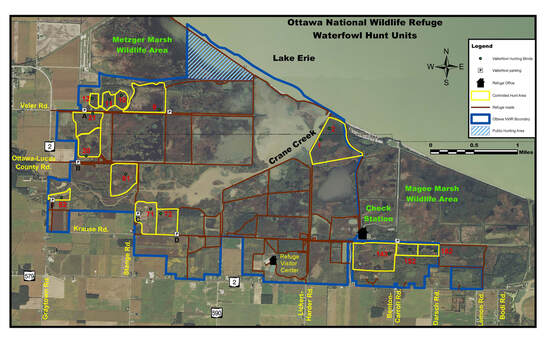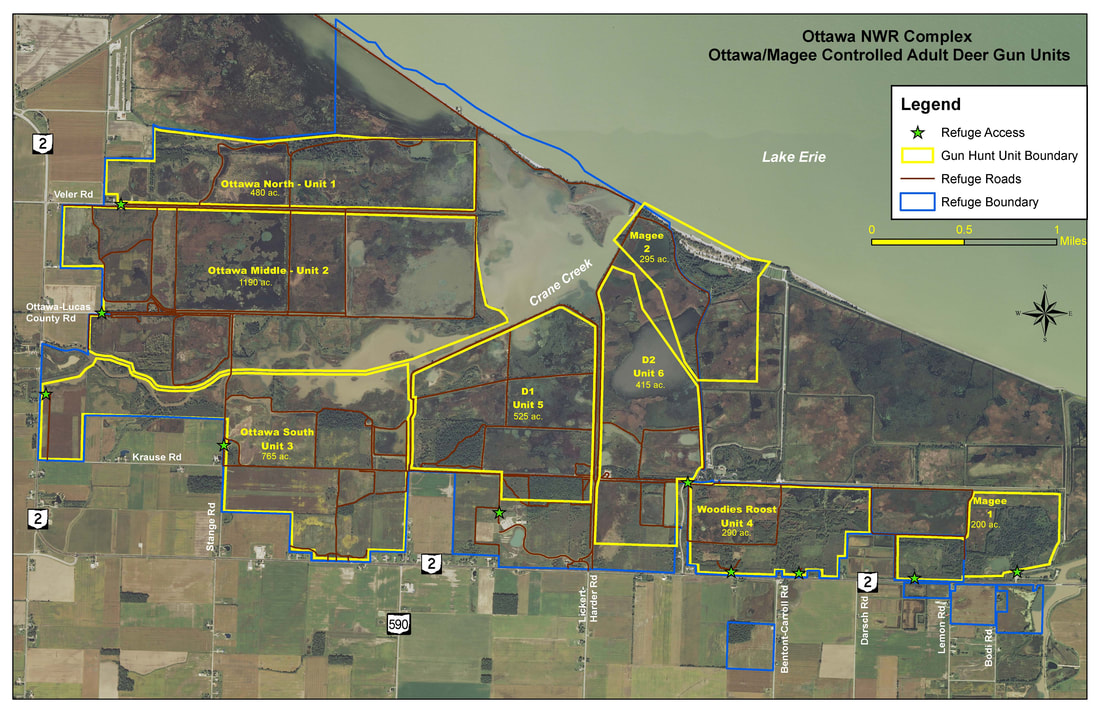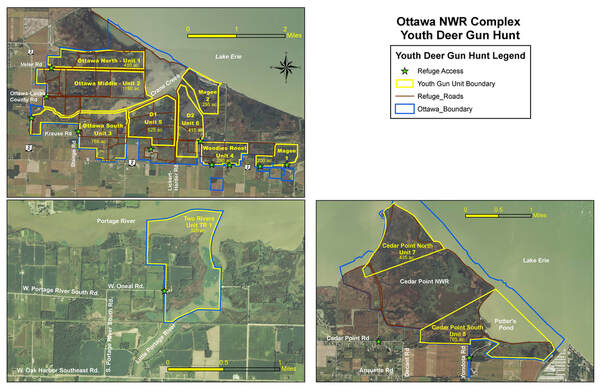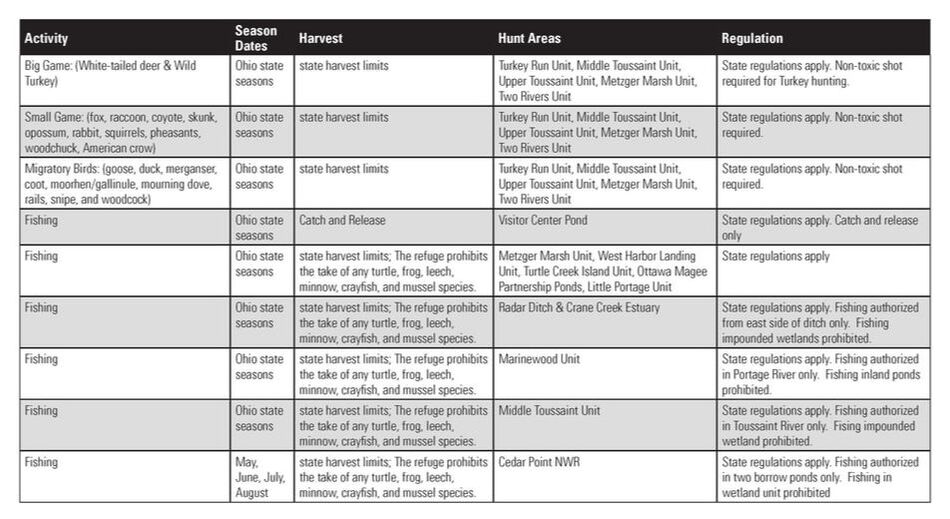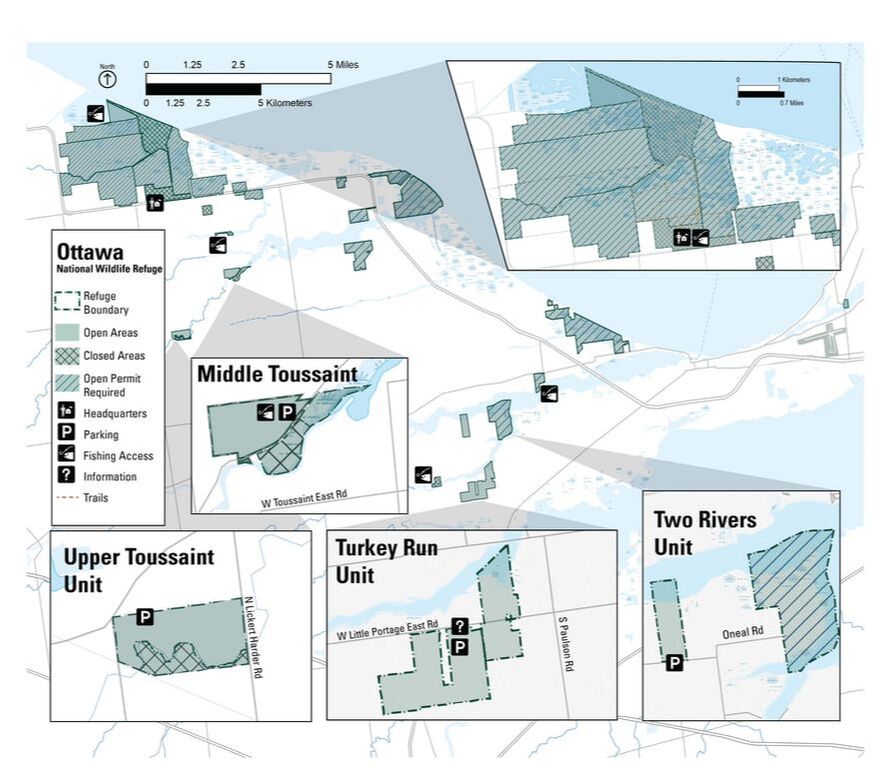Ottawa National Wildlife Refuge
Hunting and Fishing Regulations
Welcome to Ottawa National Wildlife Refuge
The refuge was established in 1961 under the authority of the Migratory Bird Conservation Act “for use as an inviolate sanctuary, or for any other management purpose, for migratory birds” (16 U.S.C. 715d). Much of the refuge was purchased with funds authorized by the Migratory Bird Conservation Act to provide habitat for waterfowl and other migratory birds, resident wildlife, and endangered and threatened species. In addition to controlled and public hunting, Ottawa National Wildlife Refuge offers a place for the public to enjoy wildlife-dependent activities such as wildlife viewing and photography, environmental education and interpretation, and fishing. Ottawa National Wildlife Refuge is part of the National Wildlife Refuge System, a national network of lands and waters managed for the benefit of wildlife and people.
Accessibility
Equal opportunity to participate in and benefit from programs and activities of the U.S. Fish and Wildlife Service is available to all individuals regardless of physical or mental ability. For more information please contact the U.S. Department of the Interior, Office of Equal Opportunity, https://www.doi.gov/pmb/eeo/ public-civil-rights.
Visitor/General Information
The refuge was established in 1961 under the authority of the Migratory Bird Conservation Act “for use as an inviolate sanctuary, or for any other management purpose, for migratory birds” (16 U.S.C. 715d). Much of the refuge was purchased with funds authorized by the Migratory Bird Conservation Act to provide habitat for waterfowl and other migratory birds, resident wildlife, and endangered and threatened species. In addition to controlled and public hunting, Ottawa National Wildlife Refuge offers a place for the public to enjoy wildlife-dependent activities such as wildlife viewing and photography, environmental education and interpretation, and fishing. Ottawa National Wildlife Refuge is part of the National Wildlife Refuge System, a national network of lands and waters managed for the benefit of wildlife and people.
Accessibility
Equal opportunity to participate in and benefit from programs and activities of the U.S. Fish and Wildlife Service is available to all individuals regardless of physical or mental ability. For more information please contact the U.S. Department of the Interior, Office of Equal Opportunity, https://www.doi.gov/pmb/eeo/ public-civil-rights.
Visitor/General Information
- Safety
Weather conditions at the refuge are often affected by Lake Erie and it can be hotter, colder or windier than it is further inland. Dress in layers, bring extra clothes, sunscreen, and sturdy shoes. Insects can be a problem; wearing long sleeves and using insect repellent is advised. Be prepared with plenty of water and food. - Firearms
Persons possessing, transporting, or carrying firearms on National Wildlife Refuge System lands must comply with all provisions of State and local law. Persons may only use (discharge) firearms in accordance with refuge regulations (50 CFR 27.42 and specific refuge regulations in 50 CFR Part 32.) - Motorized Vehicles, Parking, Camping
Park only in designated parking areas. Camping and overnight parking are prohibited. Licensed motor vehicles are permitted only on public use roads as shown on the map. ATVs and UTVs are prohibited. - General Hunting and Fishing Regulations
- Hunting and fishing regulations are designed to provide safe recreational opportunities through wise use of renewable wildlife resources. Hunting and fishing are permitted in accordance with Federal regulations governing public use on National Wildlife Refuges as set forth in Title 50 of the Code of Federal Regulations.
- Hunting and fishing will be in accordance with applicable State of Ohio regulations subject to the conditions stated below. Brochures may be obtained by mail, at the refuge visitor center, or from the refuge website.
- We allow the use of hunting dogs, provided the dog is always under the immediate control of the hunter. We allow non-motorized boats in areas open to waterfowl hunting during the waterfowl hunting season. Motorized boats are allowed in the Metzger Marsh Unit.
- Hours: The refuge is open during daylight hours. Hunting access hours are 1 ½ hours prior to the State-listed morning shooting time to 1 hour after the State-listed evening shooting time.
- General: Individuals accessing the refuge are subject to inspections of permits, licenses, hunting equipment, harvest limits, boats, vehicles and their contents by federal and state officers. Ohio state regulations and refuge specific regulations will be enforced. Refuge specific regulations supersede state regulations. Hunting is allowed only on refuge units described in this document. Only the species listed in this document may be harvested.
Hunting Regulations
- Controlled Hunt Permits: Controlled hunts at Ottawa National Wildlife Refuge are open to those who have been issued a controlled hunt permit from the Ohio Division of Wildlife. For more information about these opportunities contact Ottawa National Wildlife Refuge. To apply for these opportunities, visit the Ohio Division of Wildlife website.
- Controlled Waterfowl Hunting: Controlled waterfowl hunts take place on Mondays, Wednesdays, Fridays, and Saturdays throughout October and November. Harvest is limited to goose, duck, and coot as governed by State Regulations. Hunting access hours are 1 ½ hours prior to the State-listed morning shooting time to 1PM. Hunting hours are from State-listed morning shooting time to 12PM. Permit holders may bring one partner. Hunters can have a maximum of 25 non-toxic shells per person. Whether successful or not, hunters are required to check out by submitting a completed harvest card at the conclusion of their hunt.
- Controlled White-tailed Deer Hunting: The refuge offers five-day archery hunts September through December and single-day gun hunts in late November / early December. Hunting access hours are 1 ½ hours prior to the State-listed morning shooting time to 1 hour after the State-listed evening shooting time. Hunting hours are governed by State regulations. Permit holders may bring up to two partners for a total of three hunters. Mobility impaired permit holders may bring up to two hunting partners along with one non-hunting partner for assistance. Hunters may place portable tree stands within their unit for the duration of their hunt. Check-in times are specific to the type of hunt and will be provided prior to the hunt. Whether successful or not, hunters are required to check out by submitting a completed harvest card at the conclusion of their hunt.
- Controlled Youth Hunting: The refuge offers youth hunting opportunities for both waterfowl and deer. Youth permit holders may bring up to two hunting partners and must always be supervised by an adult. One adult may supervise a maximum of two youth. Each year the refuge and our partners offer special events and programs intended to recruit, retain, and reactivate hunters and anglers. Check the refuge website or contact the refuge for a list of youth special events and programs. **The Youth Waterfowl Hunt Workshop will not be held in 2020. Please check back for details about 2021.**
- Public Hunting: Public hunting at Ottawa National Wildlife Refuge is governed in accordance with State regulations, seasons, and harvest limits. The table below outlines areas of the refuge that are open to public hunting of migratory birds, big game, and upland game. Hunting access hours are 1 ½ hours prior to the State-listed morning shooting time to 1 hour after the State-listed evening shooting time.
- Sign Descriptions:
Refuge Boundary: Entry permitted in accordance with refuge regulations
Closed Area: All entry prohibited
No Hunting Zone: Hunting, weapons, and game retrieval prohibited
Specific Fishing Regulations
Fishing is allowed in designated fishing areas in accordance with State regulations, seasons, and harvest limits. The refuge prohibits the take of any turtle, frog, leech, minnow, crayfish, and mussel species by any method. Only catch and release fishing is allowed at the visitor center pond. Fishing is permitted from legal sunrise to legal sunset. Anglers must remove all boats, ice fishing structures, devices, and personal property from the refuge each day. Crane Creek and Crane Creek Estuary are closed to all boats and flotation devices from State Route 2 to the mouth of Crane Creek at Lake Erie. Fishing line recycling stations are provided at all fishing areas. Please follow “Leave No Trace” principles and do not leave trash along shorelines as wildlife can become entangled and die.
Prohibited Activities or Reminders:
• Trapping any animal without a permit
• Night hunting
• Cutting woody vegetation
• Bait for any species
• Use or possession of alcoholic beverages while hunting
• Camping and Fires
• Searching for or removal of any natural items such as antlers, plants, historic, and archaeological features
• Permanent tree stands, nails, screw-in steps, or other items that penetrate the outer bark of a tree
• The use or possession of any drug on any arrow
• Target shooting
• Paint, flagging, reflectors, tacks, or other human-made materials to mark trails or hunting locations
• Hunting within 150 feet of any structure, building, or parking lot
• Shooting from any roads
• Please follow “Leave No Trace” principles and do not leave trash
Fishing is allowed in designated fishing areas in accordance with State regulations, seasons, and harvest limits. The refuge prohibits the take of any turtle, frog, leech, minnow, crayfish, and mussel species by any method. Only catch and release fishing is allowed at the visitor center pond. Fishing is permitted from legal sunrise to legal sunset. Anglers must remove all boats, ice fishing structures, devices, and personal property from the refuge each day. Crane Creek and Crane Creek Estuary are closed to all boats and flotation devices from State Route 2 to the mouth of Crane Creek at Lake Erie. Fishing line recycling stations are provided at all fishing areas. Please follow “Leave No Trace” principles and do not leave trash along shorelines as wildlife can become entangled and die.
Prohibited Activities or Reminders:
• Trapping any animal without a permit
• Night hunting
• Cutting woody vegetation
• Bait for any species
• Use or possession of alcoholic beverages while hunting
• Camping and Fires
• Searching for or removal of any natural items such as antlers, plants, historic, and archaeological features
• Permanent tree stands, nails, screw-in steps, or other items that penetrate the outer bark of a tree
• The use or possession of any drug on any arrow
• Target shooting
• Paint, flagging, reflectors, tacks, or other human-made materials to mark trails or hunting locations
• Hunting within 150 feet of any structure, building, or parking lot
• Shooting from any roads
• Please follow “Leave No Trace” principles and do not leave trash
Public Hunting/Fishing Opportunities
For more information:
- To Report Violations: Refuge Law Enforcement Officer, 419-898-0014 x32
- Turn In a Poacher (TIP) Line: 1-800-POACHER
- Ottawa National Wildlife Refuge
14000 West State Route 2
Oak Harbor, Ohio 43449
419-898-0014
[email protected]
www.fws.gov/refuge/ottawa
For State relay service: V/TTY: 1-800-750-0750
U.S. Fish & Wildlife Service
1-800-344-WILD
Updated August 2020

